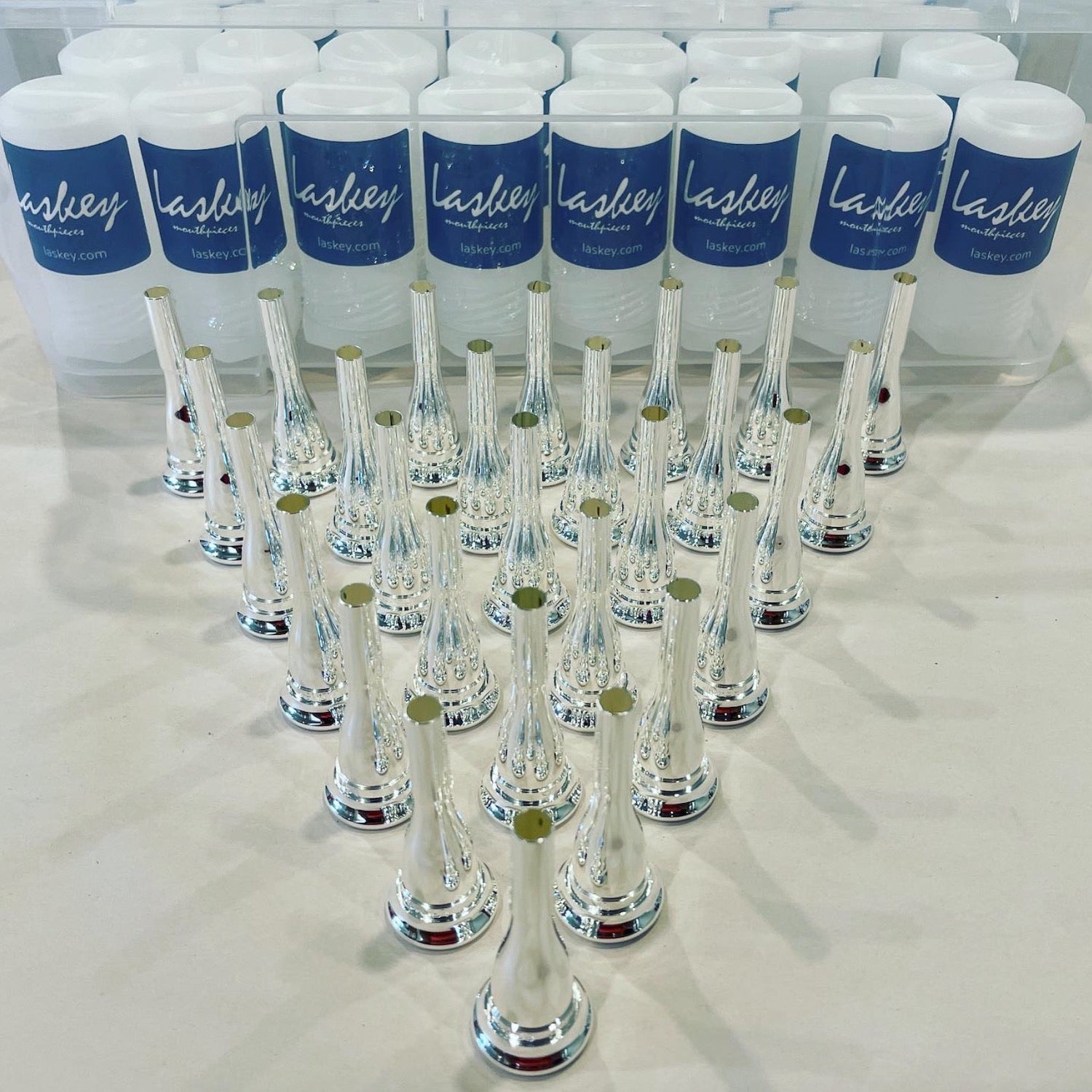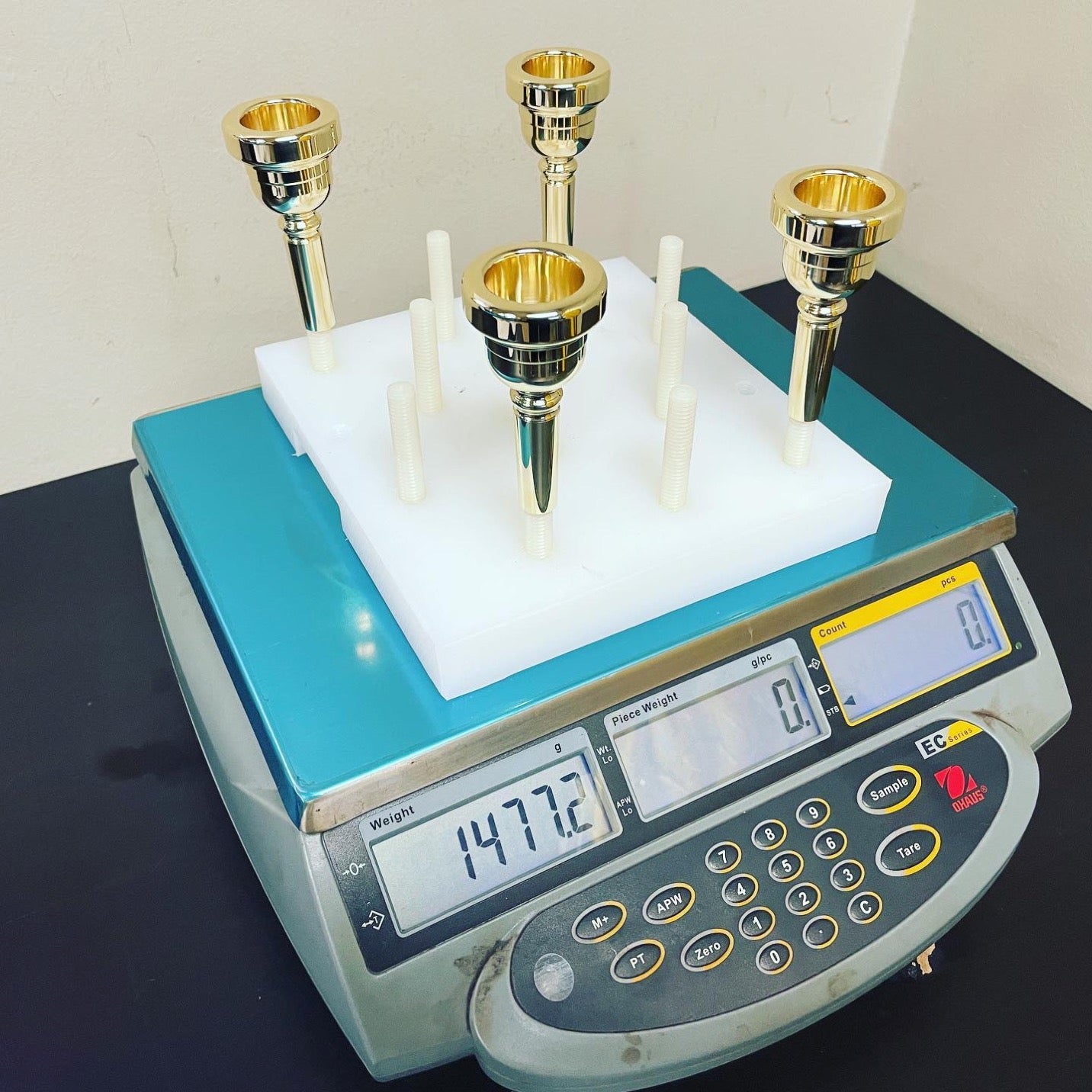This original article was written by Scott Laskey on May 24, 2016. It remains unedited.
The Debate: Gold vs Silver
As long as I have been in the business of making mouthpieces, (almost 40 years now) I am often asked about the differences between gold and silver when it comes to the plating of mouthpieces. From some musicians I hear, “I love the feel of gold and therefore I want it on my mouthpiece when I play”. Some players love the feel of gold-plate, but find out they play better on silver-plate. Sometimes, the opposite is true. To others, it does not matter. So the question has to be asked, “What are the differences?”
40 years ago I worked for a company named Schilke where for the most part I made all the custom mouthpieces for over 20 years. While there, I had the opportunity to audition for the Civic Orchestra of Chicago and got in for their summer season (which is no longer). Naturally I was quite proud of my accomplishment and decided I would take my prized mouthpiece, that I had made myself, and have it gold-plated. I carefully polished and prepped it for the plating. I drove the mouthpiece to the platers and watched them put it through the cleaning and then the gold tank. It looked spectacular as they pulled it from the gold bath. When I got home and began to practice, it felt so smooth and slick and soft on my face. That had to be a plus as we all suffer from the dreaded problem of “too much pressure” when we play.
In any case, within a couple weeks of diligent practice, I noticed a few things happening to my playing. I was losing range, endurance, articulation and flexibility. Naturally I began to wonder what was happening. So I went to Renold Schilke, my boss and teacher at the time, and asked him what was going on. He then asked if I had made any changes. I told him about the plating on the mouthpiece and he just smiled and said, “study the materials”. As this was pre-internet, I actually had to go to a library for research. I then called a couple metallurgists and was able to piece together a picture as to what was happening. One of the things I learned was that the grain structure of gold is much tighter than that of silver. When you get a little bit of moisture on the rim, it becomes slick and almost glass like against the face.
About a year ago, a question was posted in one of the Facebook forums about the differences between gold and silver-plated mouthpieces. A number of contributors were able to post the numbers and scientific data that essentially confirmed what I had experienced. I suspect that this slickness of moisture on the rim was the “soft feeling” many who play gold rave about. It is not that the gold is softer against the face; after all it is still a metal that is much harder than the flesh of our lip. The difference would be something like being hit in the lip with either a steel or brass hammer. Both would be an equally unpleasant experience.
So in many ways, while the slick feeling felt good, the sliding around of the mouthpiece on my face was not giving me the sense of security that I need when I play. Being a “wet” player (someone who licks his/her lips before placing the mouthpiece up against them), I found that with the gold, my embouchure was ever so slightly spreading apart as I was playing the extreme fortissimos. And unless I had the ultimate control of my corners, I was in a sense blowing myself out of the mouthpiece.
While it is not my role to tell you what to play on, I find that in most cases, wet players tend to play better on silver-plate. For dry player, it makes little or no difference. In order to see the difference themselves, some musicians for whom I have done some work, would order two mouthpieces in gold and two in silver. In most cases, they loved the feel of the gold, but ended up on the silver-plate.
With this said, I have also known some dry or slightly wet players who find that with the gold, there is enough “grip” along with the smoothness they like to feel against their face when playing.
I have worked with some gold-plate players who began to notice slight changes or difficulties over time. One trumpet player who is known for his high ability to play in the upper register, was having trouble locking in the Eb over double high C (something many of us trumpet players experience, I suspect). He had played gold for many years, but while watching him play, I noticed a VERY slight movement of his lip when he reached that register. A new rim was made and silver-plated. This seemed to solve the problem. The silver helped keep his embouchure in position. This does not mean that the use of silver is a crutch to his playing as we all react differently to things. In this case, with the pressure created in playing in the extreme upper register, being able to secure the embouchure made a difference.
So, should “wet players” always choose silver? There have been some musicians who have had successful careers on gold-plate while being a wet. As a rule of thumb, I usually recommend that when buying a mouthpiece, go with silver-plate unless you know your reaction to gold-plate does not negatively affect your playing. Unfortunately, it is difficult to try a gold plated mouthpiece from a music store or a manufacturer. The moment you put a gold plated mouthpiece into an instrument the shank is scratched and it makes it difficult to sell as a new mouthpiece. And to be honest, a day or two on the mouthpiece is not really enough time to tell the difference.
The purpose of this article is not to tell you what to play or what to buy, that is totally your decision. I hope that this may offer a guideline when it comes time to experimenting with the difference between silver-plate and gold-plated mouthpieces.
Copyright 2021. If referencing any of the written words above, we respectfully ask that you credit Scott Laskey as the author. Thank you in advance.



